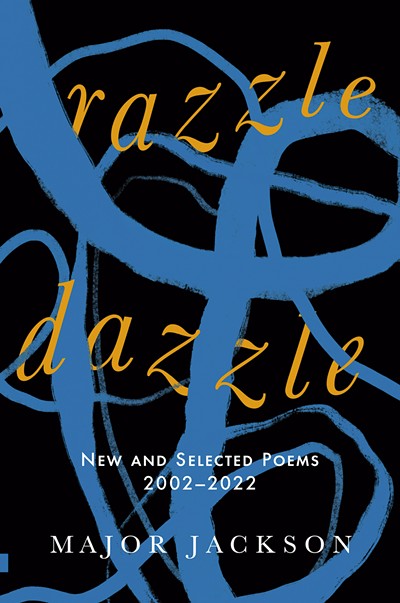
- Courtesy Of Beowulf Sheehan
- Major Jackson
Major Jackson is a writer who "started talking and reading like crazy" at 3 years old, as he told Chard deNiord, former Vermont poet laureate, in an interview in World Literature Today.
The future poet was a quiet kid, "more likely to gravitate to books than go outside." Getting his first library card, Jackson said, was just as important as getting a driver's license. He grew up attending a Pentecostal church in Philadelphia with his grandmother, and he recalled "the high drama of the pastor ... whose use of language was ritualistic and urgent and celebratory." Both jubilant church services and the hours he spent reading "spoke to the core and structure of my spirit and being-in-the-world," Jackson told deNiord.
The part-time Vermonter's latest book, Razzle Dazzle: New and Selected Poems 2002–2022, presents excerpts from his five previous collections, along with 37 newer poems. It includes a poem called "Reverse Voyage," in which he describes a rude interruption of the spell of reading:
my eyes rarely veered from a book,
even while walking one day from middle school
when a boy lunged a fist in my stomach
like a question mark. I was already awake,
a surfeit of ambition struck: to roam
like decomposing clouds rolling deep,
re-forming constantly and away, above
toughened streets, above sunlit ruins
and scattering mounds. My eyes went
elsewhere or nowhere, open and determined.
What a rhapsodic response to sudden violence: summoning metaphors and breaking into song.
Jackson's first book of poems, Leaving Saturn, was released in 2002, shortly before he moved to Burlington to teach literature and creative writing at the University of Vermont. During his 18 years at UVM, he published four more volumes of poetry: Hoops (2006), a finalist for a NAACP Image Award for Outstanding Literary Work; Holding Company (2010); Roll Deep (2015); and The Absurd Man (2020). He also wrote the essays gathered in A Beat Beyond: Selected Prose of Major Jackson (2022) and served in leadership roles for several of the state's nonprofit arts organizations, notably as board chair of Vermont Humanities and a trustee of the Vermont Studio Center and Vermont Arts Council.
In 2020, Jackson left UVM to become the Gertrude Conaway Vanderbilt Chair in the Humanities at Vanderbilt University in Nashville, Tenn. He spends breaks from teaching at his home in Rochester, in the Green Mountain National Forest.
Razzle Dazzle shows how Jackson has kept changing while circling his recurrent fascinations and testing his art with varied technical strategies. In the process, he has emerged as a bridge between what might seem like divergent "schools" of literature.
Broadly speaking, Jackson is a formalist. He often composes according to patterns, including phrasing and rhyme schemes, predetermined by tradition or by his self-devised rules. In tone and rhetorical manner, many of his poems strut or stride as though performed onstage in an elevated style, antique in certain ways and unstintingly literary. Drawing on whatever lineage he chooses, Jackson is no less the heir to metrical loyalists such as Robert Frost, Robert Hayden and W.H. Auden than to image-driven, free-verse innovators such as Pablo Neruda and Lucille Clifton.
Razzle Dazzle opens with a section of new work called "Lovesick," then goes back in time to Leaving Saturn. From there, the selections from previous books proceed chronologically, with 30- to 50-page selections from each volume.
The title of Leaving Saturn alludes to jazz futurist Sun Ra, who claimed to come from outer space and whose big band rehearsed in Jackson's neighborhood when he was a teenager, raucously audible to the kids biking by. These early poems are youthful in stance, but they're not apprentice work. Even early on, Jackson located his perspective in the "toughened streets" where he was born while staking a claim to citizenship in the artistic world at large, "from Sappho to Bob Dylan and from Archilochus to Jay-Z," as he says in an essay called "My Lyrical Self," in A Beat Beyond.

- Courtesy
- Razzle Dazzle: New and Selected Poems 2002–2022 by Major Jackson, W. W. Norton, 288 pages. $26.95.
The title of Jackson's next book, Hoops, refers not just to basketball but to the obstacles a young person must navigate along the path to adulthood. This section of Razzle Dazzle includes a sampling of Jackson's impressive "Letter to Brooks," a multipart homage to poet Gwendolyn Brooks. To honor his poetic ancestor, Jackson adapted an intricate seven-line stanza from Auden, availing himself of both its artifice and fluency for drawn-out, ruminative storytelling.
Holding Company is a set of 80 compact, square-shaped, 10-line poems that are philosophically abstract yet magnetic in their compressed intimacy of address. As a group, the 28 of these featured in Razzle Dazzle are particularly coherent and satisfying, and they may well spur readers to go find the complete sequence. (For an example, see "Forecast," in the sidebar.)
Jackson is conscious of his forebears, and Derek Walcott's influence is audible in his next book, Roll Deep — overtly so in "The Augustan Suite," with its opulent sensuality and scenic detail.
In The Absurd Man, Jackson invents a doppelgänger who triangulates between writer and reader, complicating a lyric poet's normally direct rapport:
the other Major prefers to undress in glass
revolving doors; he is a fan of prohibition
cocktails whose potions afford him time-travels
of the landed gentry. I let Major sport
his dangers, which magnify his ambitions
so he can write his grandiloquent poems,
and thus, ours is a compromised relationship:
I, more cautious than a slug, and he,
the sampler of pythons.
Readers of Razzle Dazzle will find that additional installments from Jackson's decades-long verse diary, "Urban Renewal," appear in four of the sections from previous books and in the group of new poems. And the Sun Ra series in Leaving Saturn is revisited with a kindred Sun Ra poem in Roll Deep, written more than 10 years later.
Jackson has a great appetite for allusions to other writers, musicians, painters, sculptors and philosophers, whose names populate his poems and contribute to their busy, reverberating texture. Far from sounding pompous or obscure, these allusions communicate the poet's joy at being part of a munificent, worldwide, history-deep upwelling of creativity, the inheritance of any one of us. His tributes to predecessors show how he has absorbed the stylistic idiosyncrasies he admires, which he revisits in original poems that aren't imitations but emulations.
The new poems in Razzle Dazzle are roomier in shape and looser in gait than most of the older ones. With their suave, companionable demeanor, they make associative leaps, as in "The French Quarter"
my life was a streak of quandaries and doggeries
with quaint and hospitable inscriptions
on doors, every chapter a tempest or escape hatch
at some back table where I read alone
in faint light, a thin band of gold hops
at the bottom of a beer mug.
Resisting prosaic logic and narrative closure, the newer poems sound like the offspring of early 20th-century French and Spanish surrealists, swiveling between solemnity and zaniness.
As in a well-curated art retrospective, this collection's placement of new works beside older ones allows the reader to recognize both ongoing experimentation and continuity. All through Razzle Dazzle, we see Jackson's formal derring-do and unapologetic erudition, and in the recent "Ten Album Covers," he offers this personal and aesthetic credo:
The future is a blind piano man
fingering some groove out
of ancient beats from the Roman Empire
...My belief in art is endless.
Forecast
Whichever way our shoulders move, there's joy.
Make a soft hollow noise. We've our own hourglass
and no one else to blame. I thought of our lives,
caressing ruins through half-open windows.
I hear our prayers rising. I sing to you, now,
like scented candles, your ferocious wolf.
I no longer want this weather on my breath
or the many recognizable texts of our celestial holes.
A ceiling fan turns above. The arson is in us.
This is the year I'll contemplate the fire-fangled sky.
Reprinted from Razzle Dazzle: New and Selected Poems 2002–2022. Copyright (c) 2023 by Major Jackson. Used with permission of the publisher, W. W. Norton & Company, Inc. All rights reserved.






Comments
Comments are closed.
From 2014-2020, Seven Days allowed readers to comment on all stories posted on our website. While we've appreciated the suggestions and insights, right now Seven Days is prioritizing our core mission — producing high-quality, responsible local journalism — over moderating online debates between readers.
To criticize, correct or praise our reporting, please send us a letter to the editor or send us a tip. We’ll check it out and report the results.
Online comments may return when we have better tech tools for managing them. Thanks for reading.